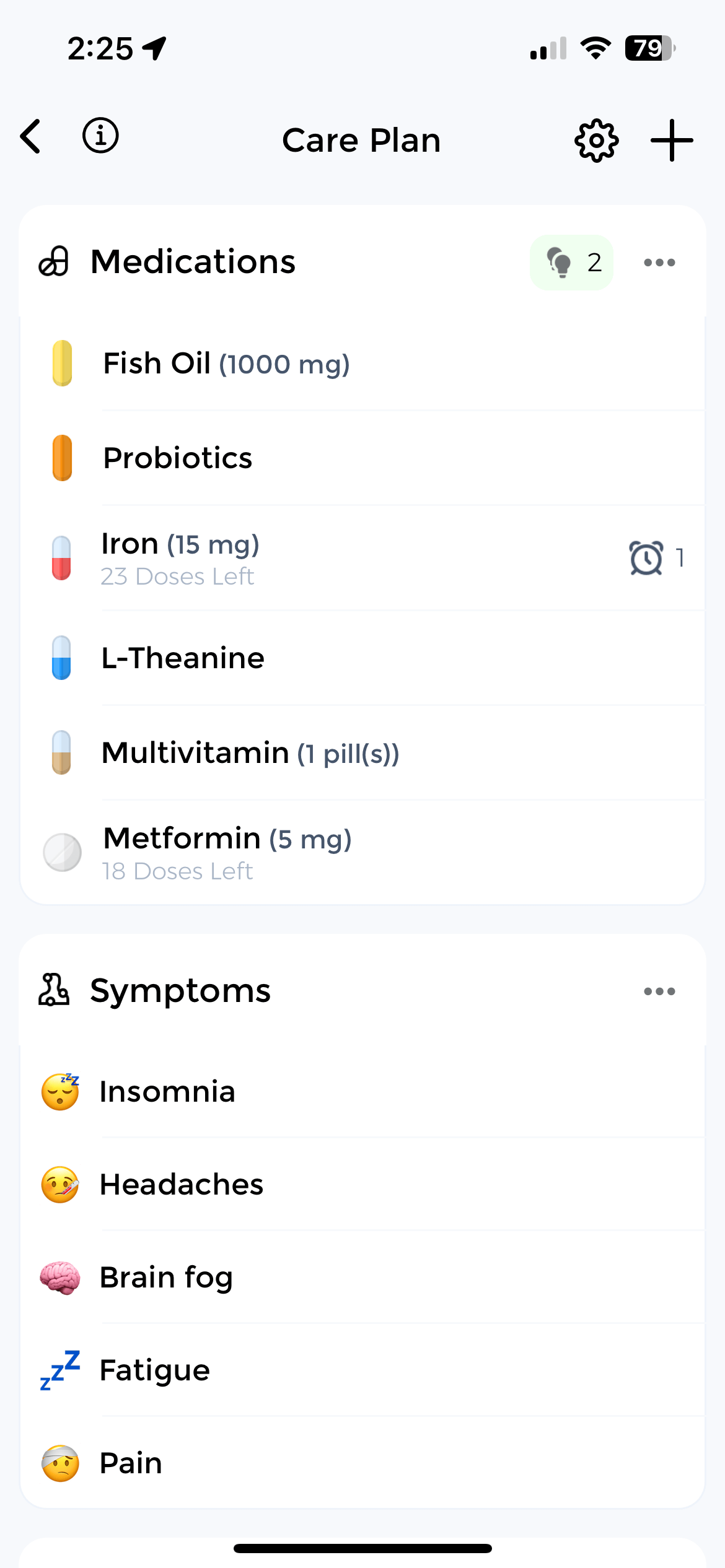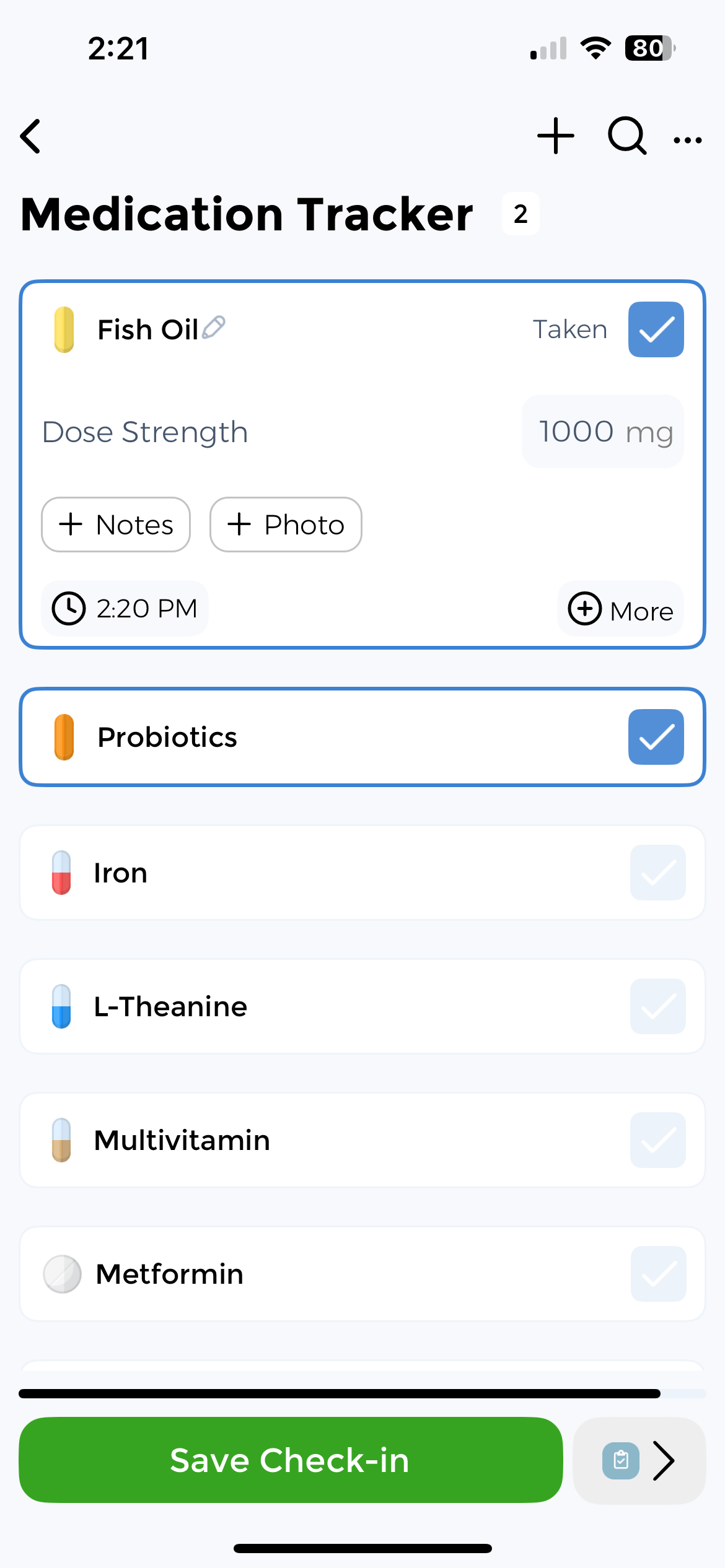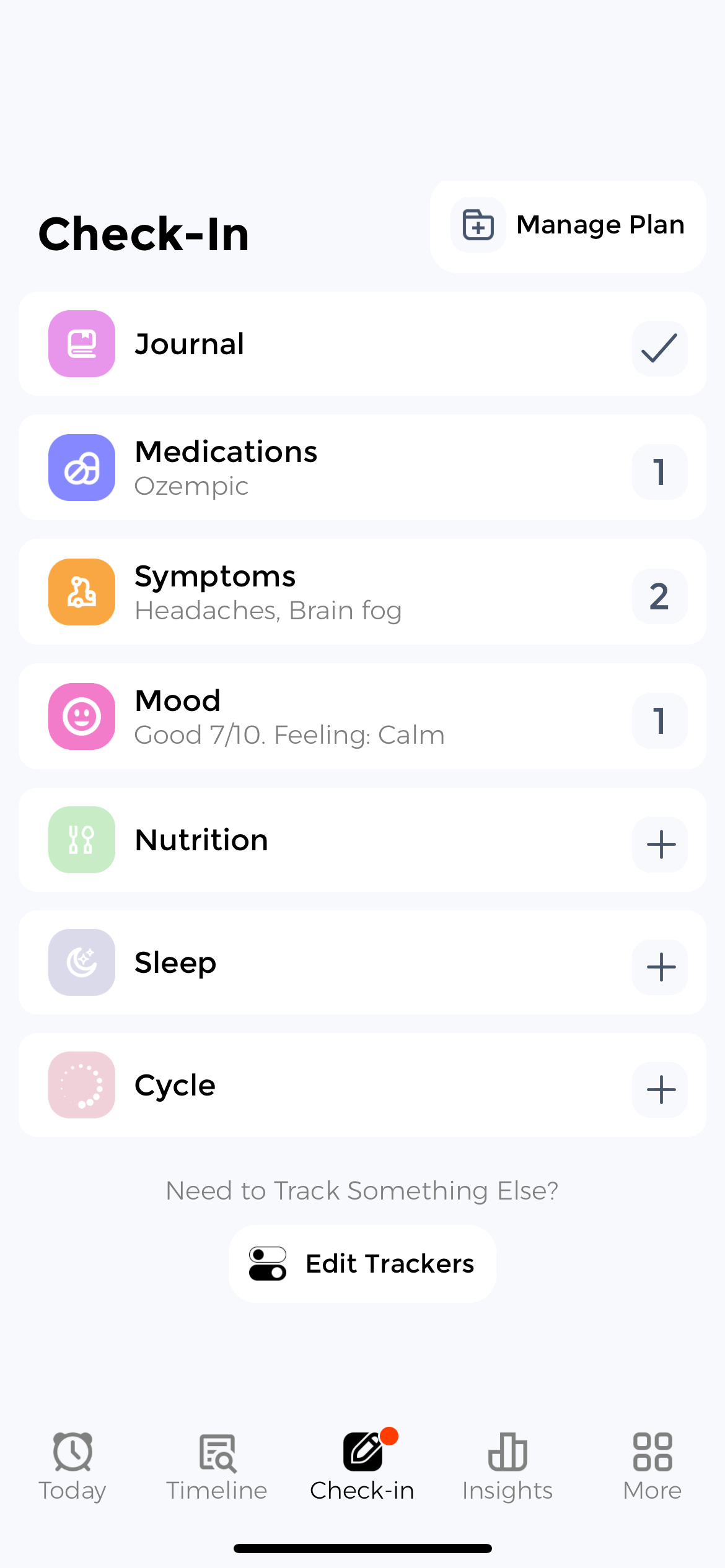Supplement Tracker
Track supplements, brands, stacks, and effects with precision.
The best supplement tracker app helps you log supplement intake daily, monitor product effectiveness, and track supplement stacks for optimal results. Whether tracking nootropics, protein supplements, creatine, or herbal compounds, our free supplement tracking app ensures every dose counts toward your health goals.
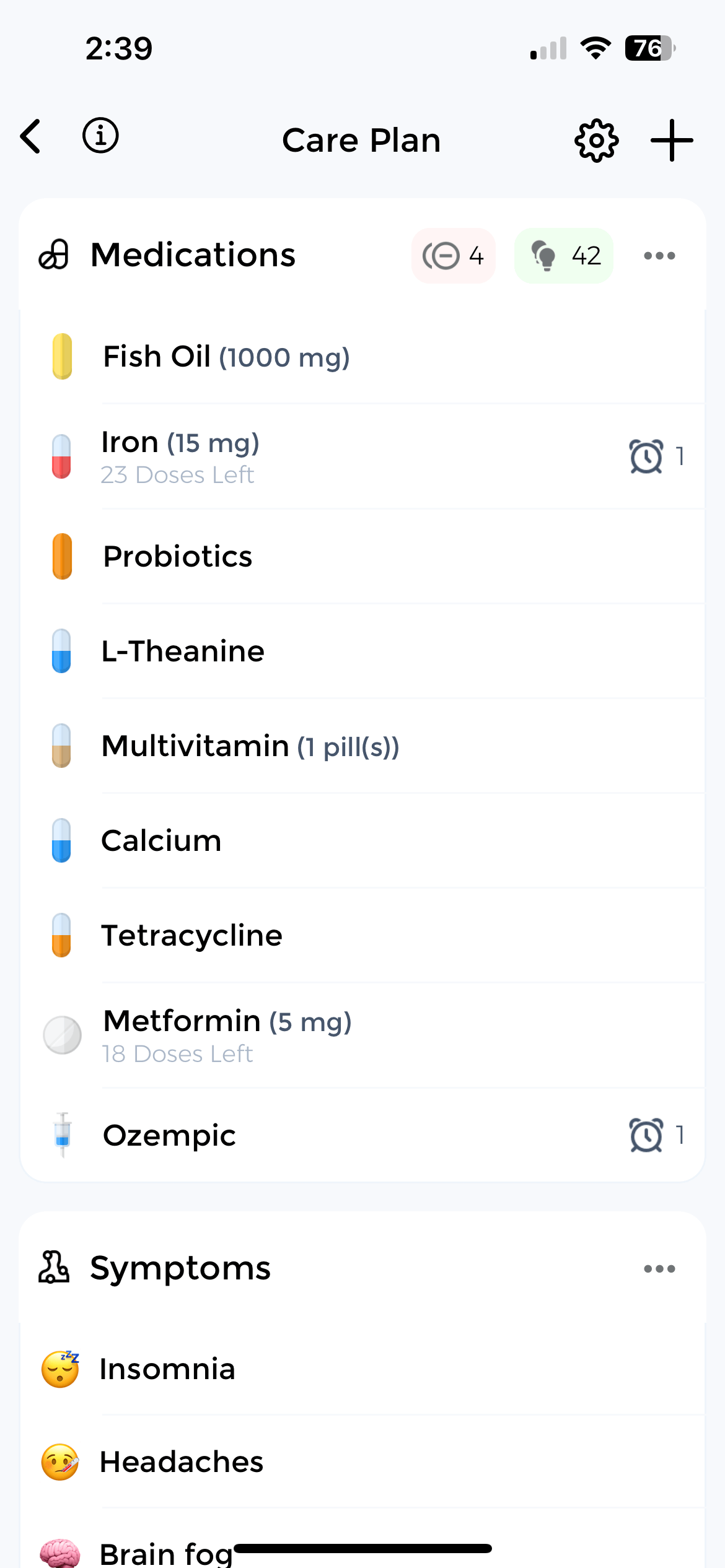
Why Track Your Supplements
You take your supplements. You hope they help. But do you know what they are doing? Most people do not. They guess their intake, double up on nutrients, or miss key vitamins completely. Using a supplement logger changes that. Track supplements systematically to understand what works, what does not, and how each product affects your health goals.
What Supplements Can You Track?
Track every supplement product by brand, batch, dosage, and timing. From nootropics to protein powders, creatine to collagen, the supplement app helps you monitor what you take and measure real outcomes.
How the Supplement Tracker Works
1. Scan or Log Products
Take photos of supplement labels and let AI extract product names, brands, dosages, and ingredients automatically. Create custom entries for any supplement product or formula.
2. Set Reminders & Schedule
Configure timing reminder notifications for morning stacks, post-workout supplements, or evening formulas. Never miss a dose with customizable daily alerts.
3. Track Effects & Outcomes
Log how you feel after each supplement. Connect outcomes to specific products and identify what works for energy, sleep, focus, recovery, or performance.
Risks of Not Tracking Supplements
Not tracking supplements creates inconsistency and dangerous interactions that kill progress. Zinc competes with copper, calcium blocks iron absorption, and vitamin E increases bleeding risk with aspirin or fish oil. Vitamin C and Adderall also interact, affecting absorption and effectiveness.
Workout Supplements
Missing doses of creatine, BCAAs, or vitamin D can throw off your training adaptation and recovery. Track every supplement log to maximize muscle growth results.
Nootropic Stacks
Different goals require different precision. If you are using nootropics like L-theanine, alpha-GPC, or bacopa, timing and dosage matter for cognitive effects. Without tracking, you cannot optimize your supplement schedule.
Daily Longevity Support
For longevity, tracking your intake of resveratrol, NAD precursors, or CoQ10 helps you avoid stacking redundant or synthetic variants that reduce effectiveness.
How to Log Daily Supplements
Tracking supplements does not need to be complicated. Start with the basics. For each product, log the brand, dosage, and time of day you take it. If it requires food or an empty stomach, write that down too. This helps with absorption and prevents stacking errors that reduce effectiveness.
Record why you are taking it. Are you taking ashwagandha for stress, creatine for strength, or curcumin for joint pain? Over time, you will start to connect specific outcomes to each compound. This lets you adjust and refine based on results, not guesses.
You should also track the form. For example, magnesium citrate acts differently from magnesium glycinate. The same goes for vitamin K1 versus K2, or synthetic versus natural folate. These differences matter, especially if your goal is to optimize brain performance, hormonal health, or inflammation. Finally, capture how you feel after taking each supplement counter dose, physically or mentally.
When to Take Supplements
Timing matters more than most people realize. Some supplements planner schedules require food for absorption, while others work best on an empty stomach. The best supplement schedule app helps you track precise timing for optimal results.
Morning Routine Timing
Take vitamin D and CoQ10 with breakfast as fat-soluble nutrients need dietary fat. Log morning doses for optimal absorption and effectiveness.
Post-Workout Supplements
Creatine works better when taken after workouts. Track protein powder servings and BCAAs post-training to maximize muscle recovery and growth.
Pre-Meal Probiotics
Probiotics are most effective when taken 30 minutes before meals. Use the supplement app tracker to set reminders for optimal probiotic timing and gut health.
Evening Recovery Formulas
Take magnesium glycinate and melatonin before bed. Track evening supplement schedule for consistent sleep improvement and recovery optimization.
Choosing a Supplement Tracker
Choosing the best supplement tracking app is not about how it looks. It is about what it helps you do. You need a supplement counter tool that fits your routine, tracks the details that matter, and helps you improve over time.
The right app logs exact doses, timing, and purpose. Track ashwagandha for stress, omega-3s for inflammation, or NAC for detox with full context, not just generic entries.
Essential features include custom entries, flexible dose units (mg/mcg/IU/grams), photo import, reminders, interaction notes, and progress reports. Paper logs lack alerts and charts. CareClinic delivers everything in one place.
Key Features That Matter
- Custom supplement entries and nutrient tracking
- Flexible dosing units (mg, mcg, IU, grams)
- Goal tagging (sleep, energy, recovery, performance)
- Daily reminder notifications based on meal or workout schedules
- Label photo import with AI data extraction
- Timing rules (“take with food” / “avoid before bed”)
- Reporting tools showing trends and symptom correlations
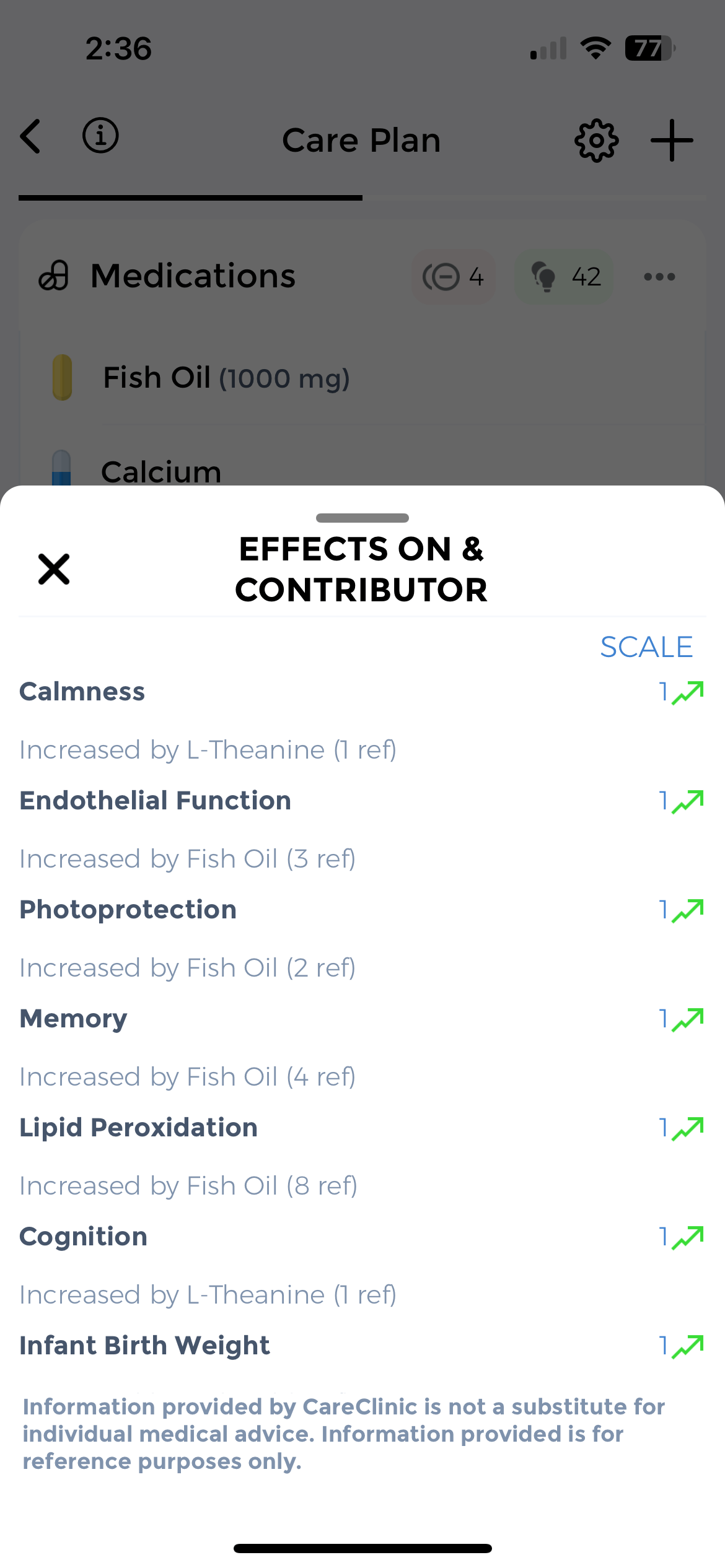
Track Supplements. Measure Effects. Optimize Results.
Are your supplements really working? Stop guessing and start tracking with the best supplement tracker app. Join thousands who log supplements for creatine, nootropics, protein, and herbal formulas to optimize their health stack.
Supplement & Lifestyle Log
The CareClinic supplement counter app is the best free supplement tracking application for monitoring daily supplement intake. Keep a supplement journal and product log to reveal essential health information beyond basic nutrient counting. Need to track the underlying nutrients in your supplements? Learn more about tracking vitamins and minerals specifically.
Product-Level Tracking
Log brand names, batch numbers, and expiration dates. Track supplement checker data for safety recalls and product quality verification.
Effect Correlations
Use the reports section to find charts, supplement logs, and correlations that reveal what is working and what needs adjustment in your stack.
Stack Management
Build morning, workout, and evening supplement stacks. Create Groups within the Tracker for different timings or health goals to enable quick check-ins and organized supplement routines.
Quick Import via Photo
Snap a photo of supplement labels from the Medication Tracker to add products instantly. For multivitamins, use the Nutrition Tracker to auto-detect and log individual micronutrients. The Care Plan includes basic synergy and interaction checks and should not replace professional guidance.
Success Story
Hear from someone who optimized their supplement stack and achieved measurable results.
Frequently Asked Questions
- “8 Things You Don’t Know About Supplements”. https://time.com/3712325/supplements-vitamins/
- “Supplements Cause More Than 23,000 ER Visits a Year”. https://time.com/4072487/supplements-cause-more-than-23000-er-visits-a-year/
- “Vitamins and Supplements Can’t Replace a Balanced Diet, Study Says”. https://time.com/5564574/supplements-vitamins-health/
- “The Supplements Doctors Actually Think You Should Take”. https://time.com/7202466/best-supplements-to-take-vitamins/
- “Multivitamins May Improve Memory, Study Shows”. https://time.com/6282259/multivitamins-improve-memory/
- “What the Science Says About the Health Benefits of Vitamins and Supplements”. https://time.com/6171584/are-vitamins-supplements-healthy/
- “Dietitians Share 7 Tips for Taking Supplements”. https://blog.insidetracker.com/tips-for-taking-supplements
- “SuppTrack: The Complete Supplement Tracker App”. https://supptrack.app/
- “7 Simple Ways to Stay Consistent with Your Supplementation – Blonyx”. https://blonyx.com/blogs/blonyx-blog/7-simple-ways-to-stay-consistent-with-your-supplementation
- “Tracking Supplement Effects: Tips for Monitoring and Adjusting – Xandro Lab”. https://us.xandrolab.com/blog/tracking-supplement-effects-tips-for-monitoring-and-adjusting/



